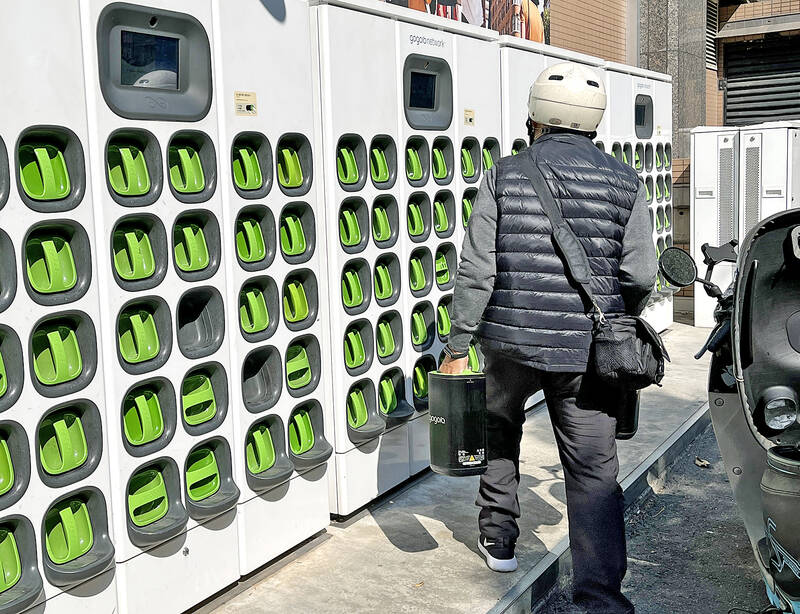Subsidies to replace old vehicles with new electric vehicles (EVs) have been extended until 2026 with the goal of discouraging the use of vehicles older than 10 years old, reducing carbon emissions and improving air quality.
Subsidies vary, depending on the type of vehicle and where it is registered. They also apply to cross-category replacements, such as a small commercial van being replaced by an EV.
For example, people who buy an EV to replace a small vehicle could receive up to NT$3,000 in subsidies and recycling bonuses if the air pollution credits are attributed to the Ministry of Environment.

Photo: Chen Chia-yi, Taipei Times
Taiwan has 6.3 million scooters, 4 million small vehicles and 100,000 large commercial vehicles that are more than a decade old, Department of Atmospheric Environment head Chang Shun-chin (張順欽) said on Wednesday last week.
The current subsidies do not allow for cross-category replacements, such as replacing a scooter with a passenger EV, but the new policy would, as some people might be interested in replacing a motorcycle with an EV or an old car with an electric scooter, Chang said.
Only EVs qualify for assistance under the new rules; hybrid vehicles are excluded, he added.
The subsidy amount varies depending on the type of vehicle being replaced. In general, subsidies to buy an electric model to replace conventional vehicles are: NT$1,000 for scooters; NT$2,000 for passenger cars; and NT$30,000 for large diesel commercial vehicles, Chang said.
Vehicles registered in Miaoli County, Hsinchu City and Hsinchu County receive higher subsidies if the carbon credits go to Hsinchu Science Park. They are: NT$2,200 for a motorcycle, NT$5,100 for a small gasoline car and up to NT$200,000 for a large diesel commercial vehicle. The three areas also offer recycling bonuses of NT$300 for scooters and NT$1,000 for cars.
Asked whether other vehicle replacement incentive policies would continue, Climate Change Administration Deputy Director-General Huang Wei-ming (黃偉鳴) said they were up for consideration.

Three batches of banana sauce imported from the Philippines were intercepted at the border after they were found to contain the banned industrial dye Orange G, the Food and Drug Administration (FDA) said yesterday. From today through Sept. 2 next year, all seasoning sauces from the Philippines are to be subject to the FDA’s strictest border inspection, meaning 100 percent testing for illegal dyes before entry is allowed, it said in a statement. Orange G is an industrial coloring agent that is not permitted for food use in Taiwan or internationally, said Cheng Wei-chih (鄭維智), head of the FDA’s Northern Center for

LOOKING NORTH: The base would enhance the military’s awareness of activities in the Bashi Channel, which China Coast Guard ships have been frequenting, an expert said The Philippine Navy on Thursday last week inaugurated a forward operating base in the country’s northern most province of Batanes, which at 185km from Taiwan would be strategically important in a military conflict in the Taiwan Strait. The Philippine Daily Inquirer quoted Northern Luzon Command Commander Lieutenant General Fernyl Buca as saying that the base in Mahatao would bolster the country’s northern defenses and response capabilities. The base is also a response to the “irregular presence this month of armed” of China Coast Guard vessels frequenting the Bashi Channel in the Luzon Strait just south of Taiwan, the paper reported, citing a

The Chinese military has built landing bridge ships designed to expand its amphibious options for a potential assault on Taiwan, but their combat effectiveness is limited due to their high vulnerability, a defense expert said in an analysis published on Monday. Shen Ming-shih (沈明室), a research fellow at the Institute for National Defense and Security Research, said that the deployment of such vessels as part of the Chinese People’s Liberation Army (PLA) Navy’s East Sea Fleet signals a strong focus on Taiwan. However, the ships are highly vulnerable to precision strikes, which means they could be destroyed before they achieve their intended

UNDER PRESSURE: The report cited numerous events that have happened this year to show increased coercion from China, such as military drills and legal threats The Chinese Communist Party (CCP) aims to reinforce its “one China” principle and the idea that Taiwan belongs to the People’s Republic of China by hosting celebratory events this year for the 80th anniversary of the end of World War II, the “retrocession” of Taiwan and the establishment of the UN, the Mainland Affairs Council (MAC) said in its latest report to the Legislative Yuan. Taking advantage of the significant anniversaries, Chinese officials are attempting to assert China’s sovereignty over Taiwan through interviews with international news media and cross-strait exchange events, the report said. Beijing intends to reinforce its “one China” principle